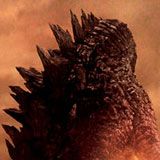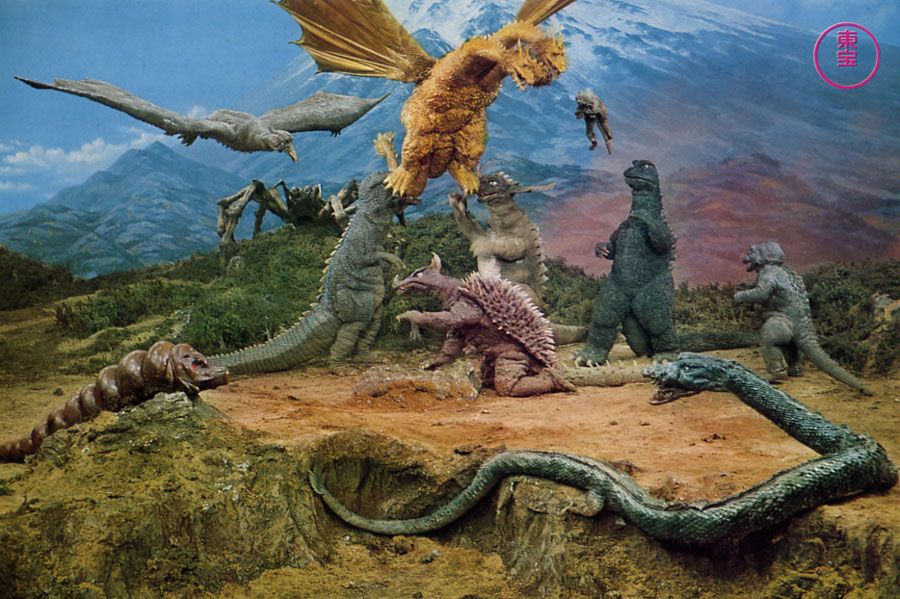Godzilla has a rich 60-year heritage that encompasses the serious and the absurd, live-action cinema and animated television – and anyone who attempted to reimagine the King of the Monsters for the 21st century would be remiss if they didn’t wade deep into that history. But director Gareth Edwards and screenwriter Max Borenstein’s, the creative minds behind Legendary Pictures’ franchise reboot, have clearly done their homework.
Spinoff Online caught up with the filmmakers on the red carpets of WonderCon Anaheim and Godzilla’s Los Angeles premiere, where they sounded off on the highs and lows of the superstar’s screen stints, from his 1954 debut to their own feature (and even the 1978 animated series).
Spinoff Online: Which of many incarnations of Godzilla over the decades would you say had the greatest influence on the film that you envisioned? And what were the elements that captured your imagination?
Gareth Edwards: It would have definitely been the first one, the 1954 version. It was basically one big metaphor for Hiroshima. At the time, it was after World War II, and there was so much censorship from the West in Japan that they couldn't really make any films about what they had gone through, so they disguised it as a monster movie, where this thing, born out of nuclear tests, destroyed a city and left radiation behind. And I think because it was born out of something so serious and profound, it's really one of the reasons why Godzilla's stood the test of time.
Max Borenstein: Going in, I would say the inspirational one to me was the original film. The 1954 Japanese version of the film is just so grounded, and this harrowing tale about nuclear war, and at the same time a badass monster movie, so it's kind of amazing.
Of the somewhat-cheesier versions of Godzilla that subsequently emerged, is there a version that’s still a personal favorite?
Edwards: Destroy All Monsters. I just like Monster Island. There's two great moments in the life of a pretend universe like this. One is the day the world finds out, the day the world learns that this is real, which is what our film's about. But then there's also just as much fun to be had with the day the world comes to terms with it. It becomes kind of normal. And so that's kind of what that whole Destroy All Monsters is doing.
Borenstein: There are a lot of cheesy versions that I love! I'm kind of fond of all of them, and I love the Smog Monster movie. Yeah, there's definitely cheese that I love but my favorite, the one closest to my heart, is that one first.
Godzilla: 60 Years of Mayhem, Metaphor and the King of the Monsters
How does this movie adhere to some great Godzilla traditions and how it breaks some new ground?
Borenstein: I think that the inspiration for us was always to go back to the root of what Godzilla was in the original film. And I remember as a kid I watched them all, but what I loved about that film was how it resonates with the period and with some larger themes. And that's the kind of thing that we started talking about in terms of we want to tell a monster movie that's going to do – that's going to use it as a way to sort of get people excited, get them emotionally engaged.
Given the original’s effective use of metaphor, what sort of contemporary, real-world issues were you hoping to subtly address with your take on Godzilla?
Edwards: There's some obvious symbolism in our film, in that in terms of the nuclear power side of things. I think the main thing is that we always try and control nature, and I think the more we try and control it and use it, the more we make life harder for ourselves. And so kind of the moral of this film, if there's any, is that we don't control nature, nature controls us. And it's only when we come to terms with that and accept it, we can actually live better.
Borenstein: I think it's all about, for us, those same fears [as the original]. What reminds us now, in this day and age when we have so much technology and so much ability to control our world, what are the things that remind us that we are insects on the surface of the planet? And so you look at Hurricane Katrina and the tsunami and things like this that, despite how far we've come as a civilization, set us back to the days when a storm could eradicate us. And Godzilla's the perfect, walking embodiment for that.
Did you absorb every previous Godzilla movie to kind of cherry-pick: “Oh, I love that element; I love this, I love that”?
Edwards: There was a little bit of that, and it was probably not something you want to admit, but we even got the Hanna-Barbera cartoons. You can buy that; it's really hard to get. There's like 28 original Japanese films, and they're really hard to get hold of. There's not like a box set where you can get them all. And I had some already, but I completed my collection doing this. I felt like I'd be a bad student if I didn't go back to the original text. But really, when we all sat down and we had this first conversation, there was this nervousness – or I had any way – of like, “OK, what's the tone? What are we trying to do?” Because I personally wanted to make something that took it very seriously, and you never know what everyone else wants to do. And everybody instantly was like, “The 1954 black-and-white version, that's our benchmark.” That was really a metaphor for Hiroshima and Nagasaki. It's not a throwaway popcorn concept. At the heart of it is some serious concepts. And so we just ran with that, but it took us a long time. There was a lot of back and forth with a good year or so of circling around. Similar ideas, but until you sort of hit the target, it took longer than I thought.
Review: "Godzilla" Stomps and Roars But Can't Remained Focused
Do you have a full slate of Godzilla stories that you want to tell should audiences respond to this one in the way that you hope?
Edwards: No. We'll see what happens. We actually had a meeting with the producers the other day, and we just came up and we were like, “Let's not jinx it. See what everyone thinks about the film.” If there's an appetite, I'll be first in line with a whole bunch of ideas.
Borenstein: There were a lot of alleys, creatively – not dead ends, but intriguing possibilities – that we sort of went down and thought, “Oh, well, maybe one day we'd come back there. It doesn't work for this movie.” And so if we're lucky enough to be able to do that then I guess it's “Get out the file folder!” and just start looking through those notes and seeing where inspiration lies.
When you talked to the Toho Company, who are the custodians of Godzilla, the Japanese creators, was there anything that they gave you, told you, that you said, “Hmm, hadn't thought about it that way,” and you wanted to make sure you really stuck with?
Edwards: Yeah, there was actually a list of five different things – like, contractually – that we had to do. And when I heard that, I was like, “Oh, dear, what's this going to be?” And then I read the list, and it was fine because our list was like 50 things, and they all overlapped. I was very lucky. We got to go to Japan. And I met Toho, the studio that did the original Godzillas, and I met the president and got hold of the original roar as a media file, and gave it to our sound designers, and it didn't hold up to the fidelity you'd expect this day and age, so we had to reinvent it. But we used that as our basis to try and recreate and mimic. So it felt like we'd gone back in time with modern day equipment and recorded the iconic roar that everyone knows.
Is there another classic Japanese kaiju monster that you'd like to pit against Godzilla?
Borenstein: I mean, I love all of them! And I think the key would always have to be, “How can we make it fit within the tone that we've established?” This sort of grounded world that feels as though it could be 2014, now, today: What if Godzilla just came up? And so any monster could fit in that, you just have to give it a certain kind of facelift to make it do that, you know?
And after your review of Hanna-Barbera, we should expect Godzooky in the sequel, right?
Edwards: Well, maybe. He might show up. This might be the origin story for Godzooky. You never know.
Godzilla opens today nationwide.


